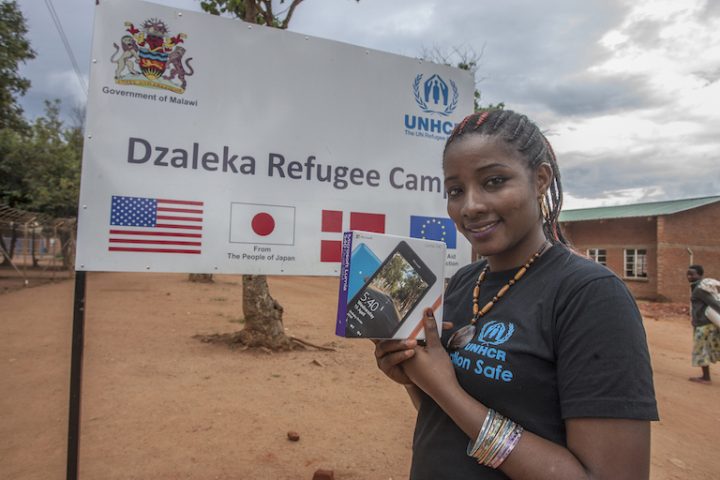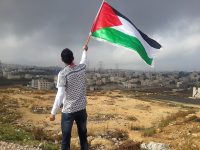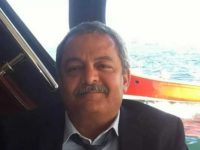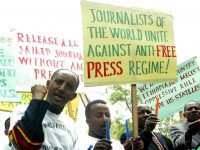On 29th November 1947, by Resolution 181, the UN General Assembly (UNGA) adopted the Partition…

Malawi, human trafficking in the UNHCR refugee camp. The long hand of the Burundian regime?
Human trafficking organized within the UNHCR Dzaleka refugee camp was discovered in Malawi. The victims are young Burundian girls. Trafficking organizer arrested: a Congolese woman also with refugee status.
Examination of telephone contacts would have revealed the identity of her collaborators in Saudi Arabia and senior government and military officials in Burundi as well as the complicity of Malawian authorities.
Human trafficking in Dzaleka would be only the tip of the iceberg of a criminal network organized by the military junta of Gitega which would involve, in addition to Burundi and Malawi, eastern Congo and Uganda as well.
In addition to the slave trade, the Gitega regime is also allegedly involved in a colossal trafficking of human organs.
This reportage reveals, starting from Malawi, a sophisticated criminal network managed by the Burundian military junta involving several countries: Burundi, East of the DRC, Malawi, Tanzania, Uganda. Human trafficking and sale of human organs often thanks to the complicity of local authorities and governments.
Dzaleka, the first refugee camp in Malawi, located about 40 kilometres north of the capital Lilongwe, was the scene of a colossal human trafficking of which victims are only Burundian refugees. The same refugees denounced the crime presenting a serial of complaints to the mobile court composed of judges and judicial police officers, set up inside the refugee camp.
Over 20 cases of human trafficking have been reported to the Malawian authorities all involving young and beautiful Burundian girls who disappeared during 2021 without anyone knowing their final destination. The parents of the victims suspect that their daughters were sold to work in slavery in the Gulf Countries, particularly Saudi Arabia. The mobile court immediately reported the complaints to the Dowa District Court, not far from the capital.
The recent disappearance, which occurred on Christmas week, of a young Burundian refugee living in the New Gatuzadistrict: Miss Sarah Hatungimana led to the arrest of a Congolese woman suspected of being involved in the criminal network of human traffickers installed inside Dzalekarefugees camp.
The Congolese woman, who also lives outside the refugee camp, was found at the time of her arrest in possession of five SIM cards containing the telephone numbers of her collaborators in Saudi Arabia and many other contacts. Anger Burundian refugees have tried to do justice by lynching the Congolese. Only the intervention of the police saved the woman from a horrible death: burned alive with tires.
The police found telephone numbers of Burundian citizens residing in the capital Lilongwe and others telephone numbers of Burundi recorded in the 5 sim cards. A preliminary investigation revealed that Burundian telephone numbers belonged to public officials and officers of the police and SNR (Service National de Reinseignement) political police controlled by the Prime Minister, Marshal General Alain-Guillaume Bunyoni.
Information of the alleged involvement of Burundian authorities was provided to us by members of Burundian civil society who are among the refugees of the Dzaleka camp but cannot find any confirmation with the Malawi authorities. It was learned that the Dowa judiciary asked to contact the Burundian government. The reasons for this request are still not disclosed.
Dzaleka is the largest refugee camp run by UNHCR. It was established in 1994 by the government of Malawi and the United Nations Refugee Agency (UNHCR) to accommodate people fleeing genocide, violence and wars in Burundi, Rwanda and the Democratic Republic of the Congo. Until 2016, it housed between 10,000 and 14,000 refugees. Political instability and social unrest in the Great Lakes and Horn of Africa regions have pushed a steady stream of refugees into Malawi for more than two decades.
Now the camp is home to more than 48,000 people from Eastern and Southern African countries, including 11,000 Burundians. Four times more than its initial capacity. Several hundred continue to arrive each month, according to the United Nations Refugee Agency (UNHCR), and 181 babies were born there in August. The deteriorating situation in neighbouring Mozambique is further increasing arrivals.
Tension between the local population and refugees has recently increased due to dramatic increases in the prices of fuel, cooking oil and other food items associated with increased bank charges and taxes, which have resulted in anti-government demonstrations. Although these increases are registered throughout the country, the population of Dzalekahave accused the refugees of being one of the causes of the high life span.
For a decade, refugees have been able to live and work outside the refugee camp thanks to a socio-economic reintegration program in host communities promoted by UNHCR and the Malawi authorities. Obviously, the accusations against the refugees have no solid basis, but fall within a context of social conflict between them and the indigenous population that focuses on the division of natural resources and employment opportunities.
To calm the population, the government issued a decree last April obliging more than 2,000 refugees who over the years had left the camp to integrate into Malawian society to return to the refugee camp, citing them as a possible threat to national security. Forced return to the camp was hampered by refugees. Many of them are married to Malawians, have a family, a business or a job and do not want to return to the refugee camp, losing loved ones, housing and work to live on the charity of others.
In December, UNHCR urged the government to reconsider the directive for the return of people to the camp, saying that while Malawi has the full right to make such a request, the order to repatriate people to an overcrowded facility has “serious rights implications. humans “.
The trafficking of human beings organized by the Congolese woman casts a serious shadow on the real protection that UNHCR can offer to refugees. We have discovered that the exploitation and trafficking of refugees are crimes that have plagued the Dzaleka camp for several years. Various types of human trafficking have been identified since 2018. Children are trafficked into and out of the camp for agricultural and domestic work. Women and girls are sexually exploited within Dzaleka camp, within the Malawi sex industry or transported for sexual exploitation to other southern African countries.
Male refugees are subjected to forced labour within the camp or on farms in Malawi and other countries in the region. There are also cases of refugees being taken to the capital Lilongwe where they are forced to work in bars, shops or as domestic workers for little or no pay.
Dzaleka camp is also used as a transit point for victims of human trafficking. Traffickers recruit victims in their home country under false pretexts, have them cross the border into Malawi and enter the camp. The traffickers had planned to smuggle them into Zambia and then transport them further to South Africa where they would be exploited.
In April, the United Nations Office on Drugs and Crime (UNODC), together with UNHCR and the United Nations International Organization for Migration (IOM) and in collaboration with the Ministry of Internal Security of Malawi, started to implement procedures to combat human trafficking in the camp. The UNODC has urged the government of Malawi to improve controls at border crossing points to allow for timely intervention measures.
“Establishing adequate mechanisms can play a crucial role in identifying potential and actual victims of trafficking. UNHCR, UNODC and IOM aim to support Malawi in fulfilling this challenging task. The prevention of human trafficking is one of the many protection problems that our team faces in the Dzaleka refugee camp and, up to now, limited resources have been dedicated to this crime “, Berhane Taklu-Nagga, Head UNHCR Malawi refugee protection.
The 20 reports of missing Burundian girls have created a serious embarrassment to UNHCR which for over a decade has been accused of serious gaps in the protection of refugees in several African countries. The last episode that endangered the lives of refugees took place on January 2, 2022 at the Um Rakuba Tigray refugee camp in Sudan. About 250 families are homeless. The fire, hastily classified by UNHCR as “accidental” but which refugees suspect malicious cause, is the third in three months. The first fire took place on October 19 and the second on December 11.
The investigations into the 20 girls who disappeared from the Dzaleka refugee camp are allegedly leading to the discovery of a regional criminal network that would involve not only the Congolese woman but also high authorities in Burundi and local law enforcement officers. Their involvement would explain the reserve of the Malawi judiciary on the case, the scarcity of official news and the attempt to pass it all off as the work of a single criminal: the Congolese refugee.
On the contrary, the events of Dzaleka would be the tip of the iceberg that hides an intense criminal activity managed directly by the Burundian military junta and its two leaders: General Neva — alias Evariste Ndayishimiye illegally occupy President mandate in June 2020 after the death of the dictator Pierre Nkurunziza, and Prime Minister Alain — Guillaume Bunyoni investigated in the International Criminal Court for crimes against humanity and under ad personam sanctions of the European Union and the United States.
The military junta, which is facing a serious (possibly irreversible) economic crisis, in addition to illegal minerals trade from neighbour DRC (coltan, diamonds and gold) from 2012 would have started to organize a vast network of human trafficking in Burundi, Congo, Tanzania and Uganda, now also arriving in Malawi.
The slave trade organized by the Burundian regime has the Gulf countries as its main clients. The victims are mainly women and domestic workers. This human trafficking is carried out for prostitution, pornography and organ trafficking as a very profitable activity for the Burundian regime with complicity established in the Gulf countries.
In 2017 this trafficking came to light thanks to an interception by the Burundian police of a trafficking of 12 girls who were leaving for Oman. The bus they had boarded was intercepted on the way to Uganda from where they would board for the emirates of the Gulf. According to confidential information, the policemen who carried out the rescue received no thanks from the then dictator Pierre Nkurunziza but were turned away for interfering in business that should not have been hindered.
In the first half of 2017, the National Observatory for Combating Transnational Crime in Burundi (OLCT) made an inventory of 338 victims of this trafficking bound for Oman and Saudi Arabia “In addition to economic and sexual exploitation, trafficked children undergo the removal of organs such as kidneys, heart and liver which are sold at a high price “, accused at the time Jacques Nshimirimana, president of the Federation of Childhood Associations in Burundi (Fenadeb).
For every girl delivered in Oman, traffickers earn up to € 1,000. Girls destined for Saudi Arabia would be the most expensive. Their gross price would vary between 2,000 and 3,000 US dollars, reveals an NGO from Burundi. Since 2015, civil society organizations estimate that more than 3,500 Burundian women have fallen into the hands of the traffickers who brought them to the Gulf countries. The Burundian associations denounced “a laissez-faire on the part of the Burundian authorities”.
Unfortunately, this is not a failure of the Burundian government to stop trafficking in human beings organized by criminal organizations. This is the direct management of traffic by the Burundian regime, initiated by dictator Pierre Nkurunziza and continued and strengthened by President General Neva — Ndayishimiye and Prime Minister Bunyoni.
Both are committed to promoting a facade of democratic openness by presenting themselves to the international community as reformists who wish to turn the page on the ethnic dictatorship imposed by their late leader: Nkurunziza. A political marketing that at the moment has not yet convinced the European Union to lift the economic sanctions decided in 2016 following the crimes against humanity committed by the HutuPower regime of the CNDD-FDD of which Nkurunziza, Ndayishimiye and Bunyoni are the VIP leaders of the party .
According to a recent IOM report, Burundi is a country of origin for human trafficking, where traffickers exploit domestic and foreign victims in the country, as well as Burundians abroad. Adults and children can be forced into forced labour, domestic servitude, prostitution and other forms of sexual exploitation, in Burundi, throughout the region and around the world.
According to IOM data, more than 1,000 victims of human trafficking have been identified and assisted in Burundi since 2017. In 2018, the Burundian news site Iwacu published a long dossier dedicated to this plague, collecting various testimonies attesting to the departure of hundreds of Burundian women to Oman and Saudi Arabia.
The network managed by the military junta extends to Uganda, transforming the neighbouring country into a logistic hub for the departure of slaves to the Gulf countries. In 2020 Ugandan police rescued 29 Burundian women and girls who were in transit to Oman and Saudi Arabia. The Directorate for Criminal and Intelligence Investigations rebuilt the criminal network that was organizing the sale of these 29 women and discovered the involvement of Burundian government authorities. The then spokesman for the Burundian interior ministry: Pierre Njurikiye, claimed that his government was unaware of these criminal activities.
From trusted Ugandan sources, we learn that the trail that led to the Burundian government discovered by the Ugandan police was not broadcast to the national media thanks to the intervention of President Yoweri Kaguta Museveni, an ally of the CNDD-FDD regime in Nkurunziza. The same sources report the creation of a Ugandan criminal network that would involve businessmen and politicians who collaborate with the Burundian military junta to sell hundreds of women to Arabs. Ugandan partners have opened at least 6 recruiting offices to cover slavery activities.
A strong accusation rejected by the Ugandan government which claims to be committed to ending the trafficking of human beings in the region. The fact is that the monitoring by the police of the departures of Burundian women from Uganda has significantly decreased while human rights associations claim that this trafficking from Burundi is steadily increasing in Uganda.
The military junta in Burundi would manage trafficking through employment agencies for jobs in the Arabian Peninsula managed by privates on behalf of the regime’s hierarchs. The collaboration of these recruitment agencies with the military and civilian authorities of the regime is evident. The preferred victims are young girls from the countryside or from the poorest and most deprived urban neighbourhoods. They are easy to manipulate with the promise of easy earnings and honest jobs in the Gulf Arab countries. The presence of government and police officials within these employment offices reassures victims that this is a serious and government-controlled recruiting service. Only when they reach their destination do they discover that they have been sold as slaves.
Some Burundian women who have emerged from this hell have reported the mistreatment to which they have been subjected. This is the case of Zuwena, a young Burundian who returned from Saudi Arabia in 2019 where she worked as a cleaning lady. “If I had to do it again, I wouldn’t leave,” she told the Iwacu news site. “I was like a prisoner. I was not allowed out. I received 160 euros per month. I had never been paid such a sum. That’s why I accepted all the mistreatment I was going through “ Zuwena explained.
Burundian regime slave trade activities are very flourishing in Tanzania thanks to the complicity of the Tanzanian authorities, historically allied with the Burundian ethnic regime for political and ideological ties. The main activities are recorded in the refugee camps of Nduta, Nyarusugu and Mtendeli, in the Tanzanian region of Kigoma on the border with Burundi managed by UNHCR which currently host 154,000 Burundian refugees. Since 2017, Burundian refugees hosted in the three camps have been victims of arbitrary arrests, enforced disappearances, torture and forced repatriation.
This violence is directly managed by the Burundian paramilitary militia Imbonerakure, by the agents of the political police of the SNR with the complicity of Tanzanian officials and policemen. In the three camps, the Imbonerakureand SNR also manage the trafficking of human beings to Arab countries. Despite some protests, UNHCR has so far failed to stop these violence and crimes, seriously compromising its refugee protection mandate.
The criminal network run by the Gitega military junta has expanded east of Congo to Goma (North Kivu province), Bukavu and Uvira (South Kivu province). The Gitega junta does excellent business by trafficking young Congolese girls with the false promise of honest and well-paid work in the Gulf countries with active participation in the colossal affair of local administrative authorities and Congolese army and police officers.
In Uvira, the regime of General Neva and Marshal General Bunyoni is also active in the trafficking of human organs belong to children. This traffic was accidentally discovered on June 28, 2021 when the Congolese police raided (on anonymous report) a Protestant church, finding a 10-year-old girl still alive who had been taken a lot of blood and the remains of a child. 14 years old hidden inside a lot. At the time of the raid, the gendarmes arrested four Burundian doctors. Other Burundians were subsequently arrested, totalling 20 individuals. Eight Congolese were arrested at the time of the raid.
A painstaking investigation by two Congolese journalists from the online weekly Linterview sparked an uproar. The investigation showed both the involvement of the Burundian authorities and the complicity of the Congolese ones. The two courageous Congolese journalists discovered that 5 days before the macabre discovery at the protested church, the national deputy Claude Misare, a native of Uvira, had warned the mayor of the city of the presence of a criminal network of buying and selling cross-border human organs that was acting. in Uvira.
Claude Misare asked the Mayor and the security services to check the city of Uvira and the borders, looking for suspicious cases and people without identity documents. Misare stated that the population was ready to cooperate in the investigation, terrified by the disappearance of too many children. Mayor and law enforcement decide to ignore Misare.
The mayor of the city of Uvira, pastor Kiza Muhato, was forced by the revelations of the two journalists to admit in a press conference the arrest of some Burundian suspected of kidnapping children. Despite this confession Muhato was not prosecuted by the Uvira judiciary. On the contrary, he was the architect of the escape of all Burundians arrested inside the church during the police raid. All these criminals returned to Burundi without having any “trouble” from the Burundian judiciary and the so called Gitega “government”.
Trafficking in human beings and human organs managed by the military junta Burundian is coming to light as it has grown so large that it is hard to ignore or cover it up. Already several Great Lakes journalists have offered extensive evidence on the criminal network, attracting the attention of the international community.
Far from disrupting the lucrative business, the Burundian military junta is adopting the ploy of sham collaboration with international authorities. A misdirection tactic that seems to be working for the moment.
In the 2021 report on trafficking in persons released on Thursday, July 1, the US State Department announced that Burundi has made significant progress in combating human trafficking. The 2021 report indicates that Burundi has managed to move from the watchlist classification of level 3 to that of level 2. Burundi is now one of the countries whose governments have made considerable efforts to meet the minimum standards for the watchlist, even if they are not yet fully compliant with the minimum standards. It is the first time that Burundi has risen in this ranking.
Over the past year, the government of Burundi says it has significantly increased the investigation and prosecution of trafficking offenses, convicted traffickers and victims rescued and referred for assistance. The regime also claims to have institutionalized training in the fight against trafficking in human beings for law enforcement officials, prosecutors and judicial officials.
The alleged commitment of the Burundian authorities to the fight against human trafficking is supported by the IOM, UN agencies and Burundian civil society organizations. The US State Department says in advance that despite these advances, much remains to be done to improve prevention, protection and prosecution in the country.
What the White House, IOM and t UN agencies do not understand (or do not want to understand) is that the governmental team set up to fight against the slave trade is absolutely not credible as it is made up of politicians and Army officers already guilty of numerous crimes against humanity. The associated civil society associations are created by the regime itself. The real Burundian civil society has been decimated and forced into exile. Many of its most famous representatives were sentenced in April 2021 to leasing him for “subversive” activities against Burundi.
How can a government suspected of organizing human trafficking be expected to seriously fight against this criminal phenomenon which would be one of its most important sources of income?





